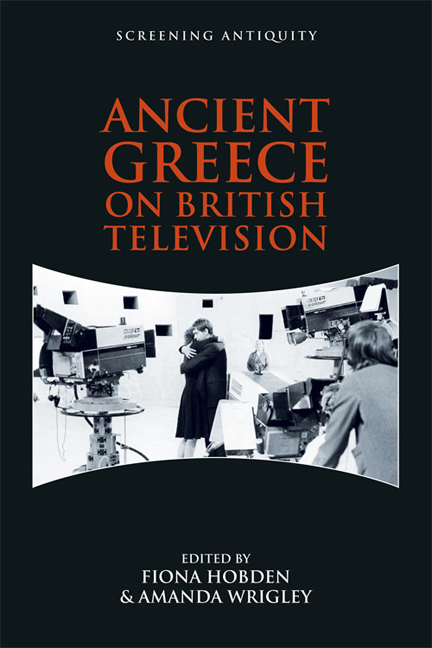Book contents
- Frontmatter
- Contents
- List of Figures and Tables
- Series Editors’ Preface
- Acknowledgements
- Contributors
- Abbreviations
- Broadcasting Greece: An Introduction to Greek Antiquity on the Small Screen
- 1 Are We the Greeks? Understanding Antiquity and Ourselves in Television Documentaries
- 2 Louis MacNeice and ‘The Paragons of Hellas’: Ancient Greece as Radio Propaganda
- 3 The Beginnings of Civilisation: Television Travels to Greece with Mortimer Wheeler and Compton Mackenzie
- 4 Tragedy for Teens: Ancient Greek Tragedy on BBC and ITV Schools Television in the 1960s
- 5 The Serpent Son (1979): A Science Fiction Aesthetic?
- 6 Don Taylor, the ‘Old-Fashioned Populist’? The Theban Plays (1986) and Iphigenia at Aulis (1990): Production Choices and Audience Responses
- 7 The Odyssey in the ‘Broom Cupboard’: Ulysses 31 and Odysseus: The Greatest Hero of Them All on Children’s BBC, 1985–1986
- 8 Greek Myth in the Whoniverse
- 9 The Digital Aesthetic in ‘Atlantis: The Evidence’ (2010)
- 10 Greece in the Making: From Intention to Practicalities in Television Documentaries. A Conversation with Michael Scott and David Wilson
- Bibliography
- Index
5 - The Serpent Son (1979): A Science Fiction Aesthetic?
Published online by Cambridge University Press: 24 April 2021
- Frontmatter
- Contents
- List of Figures and Tables
- Series Editors’ Preface
- Acknowledgements
- Contributors
- Abbreviations
- Broadcasting Greece: An Introduction to Greek Antiquity on the Small Screen
- 1 Are We the Greeks? Understanding Antiquity and Ourselves in Television Documentaries
- 2 Louis MacNeice and ‘The Paragons of Hellas’: Ancient Greece as Radio Propaganda
- 3 The Beginnings of Civilisation: Television Travels to Greece with Mortimer Wheeler and Compton Mackenzie
- 4 Tragedy for Teens: Ancient Greek Tragedy on BBC and ITV Schools Television in the 1960s
- 5 The Serpent Son (1979): A Science Fiction Aesthetic?
- 6 Don Taylor, the ‘Old-Fashioned Populist’? The Theban Plays (1986) and Iphigenia at Aulis (1990): Production Choices and Audience Responses
- 7 The Odyssey in the ‘Broom Cupboard’: Ulysses 31 and Odysseus: The Greatest Hero of Them All on Children’s BBC, 1985–1986
- 8 Greek Myth in the Whoniverse
- 9 The Digital Aesthetic in ‘Atlantis: The Evidence’ (2010)
- 10 Greece in the Making: From Intention to Practicalities in Television Documentaries. A Conversation with Michael Scott and David Wilson
- Bibliography
- Index
Summary
This chapter addresses the 1979 television series The Serpent Son. This was an adaptation of Aeschylus’ Oresteia trilogy, his 458 bc depiction of the return of Agamemnon from the Trojan War and his murder by his wife Klytemnestra (in the first play, Agamemnon), the subsequent return of his exiled son Orestes, who together with his sister Electra kills his mother and her lover Aegisthus in revenge (in the second play, Choephoroi), and Orestes’ pursuit by the Furies, spirits of vengeance, and his subsequent trial and acquittal under the auspices of the goddess Athena (in the third play, Eumenides).
The Serpent Son was made by BBC Television. It comprised three episodes, each matching the three original plays: ‘Agamemnon’, ‘Grave Gifts’ (a variation on the ‘jug-bearers’ of the Greek title, Choephoroi) and ‘Furies’ (the avenging forces who become the more beneficial ‘good spirits’ of the Eumenides). The BBC had a strong tradition of radio productions of the Oresteia, perhaps most famously in a 1956 production of a translation by Philip Vellacott which was published later the same year by Penguin Classics.
A ‘MODERN TELEVISION VERSION’
The script for The Serpent Son was ‘translated and adapted’ by Frederic Raphael and Kenneth McLeish, according to the front page of the camera scripts. McLeish had studied Classics at Oxford, whilst Raphael had taken the same subject at Cambridge, and so they both knew Greek. The text is a translation made by the authors, working from Denys Page's Oxford Classical Text, and then modified for stage performance, rather than being an adaptation based on other English translations (as is the case, for example, with Seamus Heaney's version of Sophocles’ Antigone, titled The Burial at Thebes). Raphael and McLeish had originally been commissioned to do the translation in 1976, having approached the BBC with a project that had emerged out of conversations with their friend Michael Ayrton. Subsequently, the commission was changed to Agamemnon alone, plus Euripides’ Medea and Sophocles’ Antigone, before reverting to the original idea of the Oresteia.
- Type
- Chapter
- Information
- Ancient Greece on British Television , pp. 109 - 122Publisher: Edinburgh University PressPrint publication year: 2018



